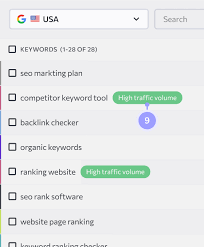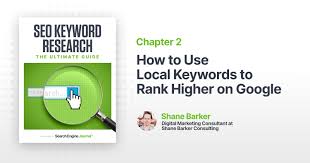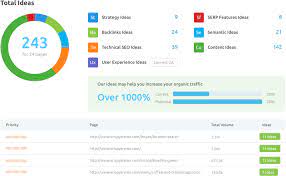The Power of rankingCoach SEO
The Power of rankingCoach SEO
In today’s digital landscape, having a strong online presence is crucial for businesses to succeed. Search engine optimisation (SEO) plays a vital role in improving a website’s visibility and driving organic traffic. One tool that has gained recognition for its effectiveness in simplifying the SEO process is rankingCoach.
What is rankingCoach?
rankingCoach is an innovative SEO tool designed to empower businesses of all sizes to improve their search engine rankings. It offers a user-friendly platform that guides users through the essential steps of SEO without the need for technical expertise.
Key Features of rankingCoach:
- Keyword Research: rankingCoach helps users identify relevant keywords that can boost their website’s visibility in search engine results.
- On-Page Optimisation: The tool provides recommendations for optimising on-page elements such as meta tags, headings, and content structure.
- Backlink Analysis: Users can analyse their backlink profile and identify opportunities to build high-quality backlinks for improved SEO performance.
- Competitor Analysis: rankingCoach allows users to track their competitors’ SEO strategies and benchmark their performance against industry rivals.
- Performance Tracking: Users can monitor their website’s performance through comprehensive analytics and reporting features provided by rankingCoach.
The Benefits of Using rankingCoach:
By leveraging the power of rankingCoach, businesses can experience several benefits, including:
- Improved Search Engine Rankings: With targeted SEO recommendations, businesses can enhance their online visibility and climb higher in search engine results pages.
- Increase in Organic Traffic: By implementing effective SEO strategies, businesses can attract more organic traffic to their website, leading to potential conversions and sales.
- Cost-Effective Solution: rankingCoach offers a cost-effective way for businesses to manage their SEO efforts without the need for hiring expensive agencies or consultants.
- User-Friendly Interface: The intuitive interface of rankingCoach makes it easy for users to navigate through the platform and implement recommended SEO actions efficiently.
In Conclusion
In conclusion, rankingCoach is a powerful tool that empowers businesses to take control of their SEO strategies and achieve tangible results. By utilising its features and following its recommendations, businesses can enhance their online presence, attract more organic traffic, and ultimately drive success in the competitive digital landscape.
18 Common Questions About RankingCoach and SEO: Understanding Rankings, Tools, and Strategies
- What is the ranking system of SEO?
- How do I check my SEO ranking?
- What is ranking factor in SEO?
- What are Seos used for?
- What are the 3 pillars of SEO?
- How do I rank higher in SEO?
- What are the 3 types of SEO?
- Does Google have an SEO tool?
- What are the 4 types of SEO?
- Does SEO still exist?
- Do seos really work?
- Why are backlinks important in SEO?
- How to be #1 in SEO?
- What is rankingCoach?
- How do you rank #1 on Google?
- How do I get Google SEO for free?
- How to do SEO for coding websites?
- Is SEO paid or free?
What is the ranking system of SEO?
The ranking system of SEO, also known as Search Engine Optimization, refers to the process by which search engines evaluate and position websites in search results based on various factors. Search engines like Google use complex algorithms to determine the relevance and authority of web pages in response to user queries. Key elements that influence a website’s ranking include quality and relevance of content, use of relevant keywords, backlink profile, site speed, mobile-friendliness, and user experience. By understanding and optimising these factors, businesses can improve their website’s ranking in search engine results pages (SERPs) and increase their visibility to potential customers online.
How do I check my SEO ranking?
To check your SEO ranking, you can utilise various tools and methods to assess where your website stands in search engine results pages (SERPs). One common approach is to use online tools like rankingCoach that provide insights into your website’s performance and keyword rankings. Additionally, you can manually conduct searches on search engines using relevant keywords to see where your website appears in the results. Monitoring metrics such as organic traffic, keyword positions, and backlink quality can also give you a comprehensive understanding of your SEO ranking and help identify areas for improvement. Regularly tracking these indicators is essential to gauge the effectiveness of your SEO efforts and make informed decisions to enhance your online visibility.
What is ranking factor in SEO?
In the realm of SEO, a frequently asked question revolves around the concept of ranking factors. Ranking factors in SEO refer to the various elements and criteria that search engines consider when determining the position of a website in search results. These factors can include on-page elements such as keywords, content quality, and meta tags, as well as off-page factors like backlinks and domain authority. Understanding and optimising these ranking factors is essential for businesses looking to improve their visibility online and attract organic traffic to their websites.
What are Seos used for?
Search engine optimisation (SEO) is a fundamental digital marketing strategy used to enhance a website’s visibility and ranking in search engine results pages. SEOs are primarily used to attract organic traffic to a website by optimising its content, structure, and performance according to search engine algorithms. By implementing SEO techniques such as keyword research, on-page optimisation, and link building, businesses can improve their online presence, increase their chances of being discovered by potential customers, and ultimately drive conversions. In essence, SEOs play a crucial role in helping websites stand out in the vast online landscape and reach their target audience effectively.
What are the 3 pillars of SEO?
When delving into the realm of SEO, it is essential to understand the three fundamental pillars that form the backbone of search engine optimisation. The 3 pillars of SEO encompass on-page optimisation, off-page optimisation, and technical SEO. On-page optimisation focuses on enhancing elements within the website itself, such as content quality, keyword usage, and meta tags. Off-page optimisation involves building a strong backlink profile and establishing authority through external sources. Technical SEO deals with the technical aspects of a website, ensuring optimal performance in terms of site speed, mobile-friendliness, and indexability. Mastering these three pillars is key to unlocking the full potential of an effective SEO strategy.
How do I rank higher in SEO?
To rank higher in SEO, it is essential to implement a comprehensive strategy that focuses on various key aspects. Start by conducting thorough keyword research to identify relevant terms that your target audience is searching for. Optimise your website’s on-page elements, such as meta tags, headings, and content, to align with these keywords. Building high-quality backlinks from reputable websites can also boost your site’s authority and credibility in the eyes of search engines. Regularly monitor and analyse your performance using tools like rankingCoach to track progress and make necessary adjustments to stay ahead in the competitive search engine rankings. Consistency, quality content creation, and staying updated with SEO trends are vital for achieving and maintaining higher rankings in search results.
What are the 3 types of SEO?
When exploring the realm of SEO, it is common to encounter the question: “What are the 3 types of SEO?” The three primary types of SEO are on-page SEO, off-page SEO, and technical SEO. On-page SEO focuses on optimising individual web pages to improve search engine rankings and user experience. Off-page SEO involves activities outside the website, such as link building and social media marketing, to enhance site authority and credibility. Technical SEO pertains to the backend aspects of a website, including site speed, mobile-friendliness, and structured data markup, ensuring optimal performance for search engines. Understanding these three types of SEO is essential for developing a comprehensive strategy to boost online visibility and drive organic traffic.
One frequently asked question regarding rankingCoach SEO is, “Does Google have an SEO tool?” While Google itself does not offer a specific SEO tool, it provides various resources such as Google Search Console and Google Analytics that can aid in monitoring and improving website performance. However, for comprehensive SEO guidance and actionable insights, businesses often turn to third-party tools like rankingCoach, which are specifically designed to streamline the SEO process and help websites achieve better visibility on search engine results pages.
What are the 4 types of SEO?
One frequently asked question regarding rankingCoach SEO is, “What are the 4 types of SEO?” Understanding the different types of SEO is essential for businesses looking to enhance their online presence. The four main types include on-page SEO, off-page SEO, technical SEO, and local SEO. On-page SEO focuses on optimising individual web pages for specific keywords and content relevance. Off-page SEO involves building external links and promoting a website through social media and other channels. Technical SEO deals with website structure, speed, and other technical aspects that impact search engine rankings. Lastly, local SEO targets localised searches to improve visibility within a specific geographic area. By leveraging these different types of SEO strategies effectively, businesses can boost their online visibility and attract more organic traffic to their websites.
Does SEO still exist?
In response to the frequently asked question, “Does SEO still exist?” – the answer is a resounding yes. Search engine optimisation (SEO) remains a fundamental and ever-evolving practice in the digital realm. As search engines continue to refine their algorithms and user preferences shift, the importance of SEO only grows. By implementing effective SEO strategies, businesses can improve their online visibility, attract organic traffic, and stay competitive in the dynamic online landscape. SEO is not just alive; it is essential for businesses looking to thrive and succeed in today’s digital world.
Do seos really work?
The question “Do SEOs really work?” is a common query among businesses seeking to improve their online presence. The effectiveness of SEO strategies can vary depending on various factors such as the competitiveness of the industry, the quality of the content, and the consistency of SEO efforts. When implemented correctly, SEO techniques like keyword optimisation, backlink building, and content creation can significantly enhance a website’s visibility in search engine results and drive organic traffic. It’s essential for businesses to understand that SEO is a long-term investment that requires ongoing monitoring and adjustments to stay ahead in the digital landscape. With the right approach and tools like rankingCoach SEO, businesses can experience tangible results and boost their online success over time.
Why are backlinks important in SEO?
Backlinks play a crucial role in SEO as they serve as a vote of confidence from one website to another. Search engines like Google consider backlinks as a signal of trust and authority, indicating that a website is reputable and valuable. By acquiring high-quality backlinks from authoritative websites, a site can improve its own credibility and visibility in search engine results. Backlinks not only drive referral traffic but also contribute to higher search engine rankings, making them an essential element of any successful SEO strategy.
How to be #1 in SEO?
Achieving the top position in SEO, often referred to as being #1 in search engine rankings, is a common goal for businesses looking to maximise their online visibility and attract more organic traffic. To reach this coveted spot, it’s essential to implement a comprehensive SEO strategy that focuses on key elements such as keyword research, on-page optimisation, high-quality content creation, backlink building, and continuous performance tracking. By consistently refining and adapting these strategies based on data-driven insights and industry best practices, businesses can increase their chances of ranking #1 in search engine results pages and staying ahead of the competition.
What is rankingCoach?
“rankingCoach is a user-friendly and innovative SEO tool that has been designed to empower businesses of all sizes to improve their search engine rankings effectively. It simplifies the complex process of search engine optimisation by providing step-by-step guidance without the need for technical expertise. With features such as keyword research, on-page optimisation recommendations, backlink analysis, competitor tracking, and performance monitoring, rankingCoach equips users with the tools they need to enhance their online visibility and drive organic traffic to their websites.”
How do you rank #1 on Google?
Achieving the top ranking on Google, commonly referred to as ranking #1, requires a strategic approach to search engine optimisation. To rank #1 on Google, businesses need to focus on several key factors, including relevant keyword research, high-quality content creation, effective on-page optimisation, building authoritative backlinks, and ensuring a positive user experience on their website. By implementing a comprehensive SEO strategy that addresses these aspects and staying abreast of Google’s algorithm updates, businesses can increase their chances of securing the coveted top spot in Google search results.
How do I get Google SEO for free?
For those seeking to enhance their website’s visibility on Google without incurring additional costs, leveraging free Google SEO strategies can be highly beneficial. By focusing on key aspects such as creating high-quality content, optimising meta tags and headings, improving site speed and mobile-friendliness, and obtaining quality backlinks from reputable sources, businesses can improve their search engine rankings organically. Additionally, utilising Google Search Console to monitor website performance, identifying and fixing technical issues, and regularly updating content to align with relevant keywords are essential practices for achieving free Google SEO success. By implementing these strategies effectively, businesses can boost their online presence without the need for paid advertising or services.
How to do SEO for coding websites?
Optimising SEO for coding websites requires a strategic approach that combines technical expertise with SEO best practices. When it comes to coding websites, focusing on clean and efficient code structure is essential for search engine visibility. Ensuring that the website’s code is well-organised, free of errors, and follows SEO-friendly practices such as using appropriate meta tags, structured data markup, and responsive design is crucial. Additionally, implementing proper URL structures, optimising images with descriptive alt text, and prioritising site speed are key factors in enhancing the SEO performance of coding websites. By combining strong coding principles with effective SEO strategies, coding websites can achieve higher search engine rankings and improved online visibility.
Is SEO paid or free?
When it comes to SEO, it is important to understand that Search Engine Optimization itself is a free practice aimed at improving a website’s visibility in organic search results. However, the process of implementing SEO strategies may involve both paid and free elements. While the core principles of SEO, such as keyword research, on-page optimisation, and content creation, can be done without cost, businesses may choose to invest in paid tools or services like rankingCoach for more advanced features and guidance. Ultimately, SEO can be approached through a combination of free techniques and paid resources to enhance a website’s search engine rankings effectively.








